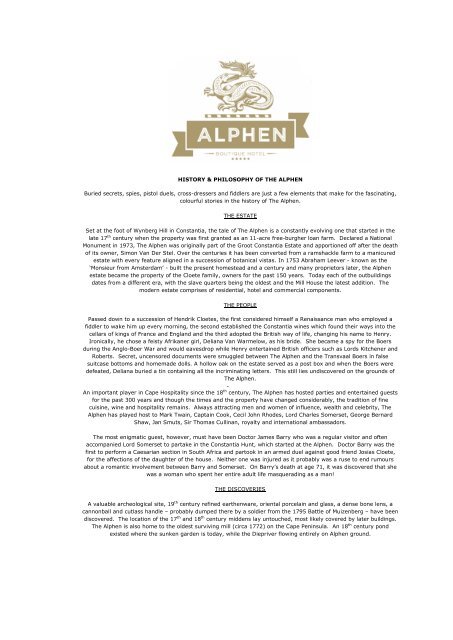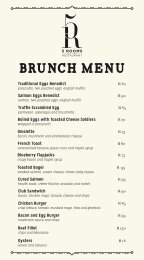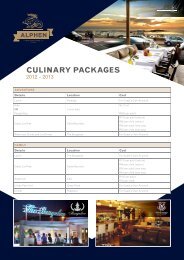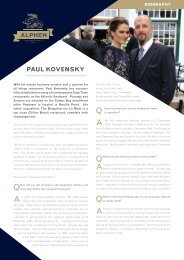HISTORY & PHILOSOPHY OF THE ALPHEN Buried ... - Alphen Hotel
HISTORY & PHILOSOPHY OF THE ALPHEN Buried ... - Alphen Hotel
HISTORY & PHILOSOPHY OF THE ALPHEN Buried ... - Alphen Hotel
Create successful ePaper yourself
Turn your PDF publications into a flip-book with our unique Google optimized e-Paper software.
<strong>HISTORY</strong> & <strong>PHILOSOPHY</strong> <strong>OF</strong> <strong>THE</strong> <strong>ALPHEN</strong><strong>Buried</strong> secrets, spies, pistol duels, cross-dressers and fiddlers are just a few elements that make for the fascinating,colourful stories in the history of The <strong>Alphen</strong>.<strong>THE</strong> ESTATESet at the foot of Wynberg Hill in Constantia, the tale of The <strong>Alphen</strong> is a constantly evolving one that started in thelate 17 th century when the property was first granted as an 11-acre free-burgher loan farm. Declared a NationalMonument in 1973, The <strong>Alphen</strong> was originally part of the Groot Constantia Estate and apportioned off after the deathof its owner, Simon Van Der Stel. Over the centuries it has been converted from a ramshackle farm to a manicuredestate with every feature aligned in a succession of botanical vistas. In 1753 Abraham Leever - known as the‘Monsieur from Amsterdam’ - built the present homestead and a century and many proprietors later, the <strong>Alphen</strong>estate became the property of the Cloete family, owners for the past 150 years. Today each of the outbuildingsdates from a different era, with the slave quarters being the oldest and the Mill House the latest addition. Themodern estate comprises of residential, hotel and commercial components.<strong>THE</strong> PEOPLEPassed down to a succession of Hendrik Cloetes, the first considered himself a Renaissance man who employed afiddler to wake him up every morning, the second established the Constantia wines which found their ways into thecellars of kings of France and England and the third adopted the British way of life, changing his name to Henry.Ironically, he chose a feisty Afrikaner girl, Deliana Van Warmelow, as his bride. She became a spy for the Boersduring the Anglo-Boer War and would eavesdrop while Henry entertained British officers such as Lords Kitchener andRoberts. Secret, uncensored documents were smuggled between The <strong>Alphen</strong> and the Transvaal Boers in falsesuitcase bottoms and homemade dolls. A hollow oak on the estate served as a post box and when the Boers weredefeated, Deliana buried a tin containing all the incriminating letters. This still lies undiscovered on the grounds ofThe <strong>Alphen</strong>.-An important player in Cape Hospitality since the 18 th century, The <strong>Alphen</strong> has hosted parties and entertained guestsfor the past 300 years and though the times and the property have changed considerably, the tradition of finecuisine, wine and hospitality remains. Always attracting men and women of influence, wealth and celebrity, The<strong>Alphen</strong> has played host to Mark Twain, Captain Cook, Cecil John Rhodes, Lord Charles Somerset, George BernardShaw, Jan Smuts, Sir Thomas Cullinan, royalty and international ambassadors.The most enigmatic guest, however, must have been Doctor James Barry who was a regular visitor and oftenaccompanied Lord Somerset to partake in the Constantia Hunt, which started at the <strong>Alphen</strong>. Doctor Barry was thefirst to perform a Caesarian section in South Africa and partook in an armed duel against good friend Josias Cloete,for the affections of the daughter of the house. Neither one was injured as it probably was a ruse to end rumoursabout a romantic involvement between Barry and Somerset. On Barry’s death at age 71, it was discovered that shewas a woman who spent her entire adult life masquerading as a man!<strong>THE</strong> DISCOVERIESA valuable archeological site, 19 th century refined earthenware, oriental porcelain and glass, a dense bone lens, acannonball and cutlass handle – probably dumped there by a soldier from the 1795 Battle of Muizenberg – have beendiscovered. The location of the 17 th and 18 th century middens lay untouched, most likely covered by later buildings.The <strong>Alphen</strong> is also home to the oldest surviving mill (circa 1772) on the Cape Peninsula. An 18 th century pondexisted where the sunken garden is today, while the Diepriver flowing entirely on <strong>Alphen</strong> ground.
<strong>THE</strong> WINEIn true Cape Dutch culture, <strong>Alphen</strong> was a working farm that produced export fruit. It was the first estate in SouthAfrica to grow grapes, make and bottle wine and sell it to the public. Together with two other farms – GrootConstantia and High Constantia – it became the biggest wine-producer in the area. Well-known for its sweet dessertwines, some British soldiers broke into <strong>Alphen</strong>’s cellar and sampled the contents during their advancement onWynberg in 1795. In 1886 every vine at <strong>Alphen</strong> was destroyed after the ravaging disease, phylloxera, wasdiscovered in Constantia. In later years Louis Cloete studied viticulture in France and revitalised the family’s interestin the wine trade, which resulted in a successful business venture.<strong>THE</strong> HOTELWhen Sandy Bairnsfather-Cloete inherited the land in 1962 he decided to convert The <strong>Alphen</strong> into a hotel with 29rooms and 47 beds. This would allow for visitors from all over the world to again experience this tradition ofexceptional hospitality.Now, 50 years later, a new era has arrived with the revamping of the <strong>Hotel</strong> to a 5-star chic, contemporary, classyand vibrant venue with a Café & Bakery, Restaurant, Spa, Conference & Business Centre and Bars.Through the centuries The <strong>Alphen</strong> has witnessed and withstood many challenges – changing ownership andstructures, wars, torrential rains and possible closure. Yet the renaissance of The <strong>Alphen</strong> continues under thewatchful guard of its symbol, the Salamander – a mythical beast whom endures fire without itself being burnt…








